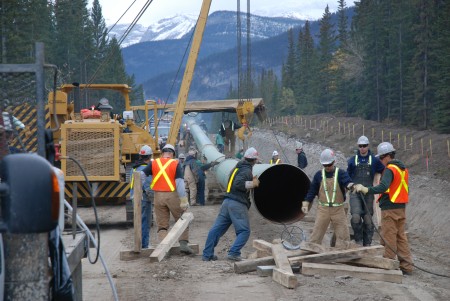When insurers bug out of an oil pipeline being built along an already established route, what are these companies saying to the fossil fuel energy industry?
In the last week, Argo Group International Holdings Ltd., an insurance underwriter, announced it was not renewing its policy for the Trans Mountain Pipeline (TMP). It noted that the pipeline project did not fit within the company’s current acceptable level of risk guidelines. Argo’s move followed Zurich Insurance Group AG, another underwriter that dropped TMP late in 2020.
The TMP is part of the Trans Mountain Corporation which currently operates the only fossil-fuel carrying pipeline travelling from Alberta to Canada’s West Coast. The current capacity of the line is 300,000 barrels a day. The pipeline is 1,150 kilometres (713 miles) long between Alberta and the port o Burnaby, British Columbia. A satellite 111-kilometre (69 miles) pipeline links to a refinery in Washington state.
Expansion of the TMP has been on the planning books for years. The past owner of the line Kinder-Morgan, a U.S.-based energy company, after numerous delays to the project finally bailed out and the Canadian government stepped in to purchase it turning it into a Crown corporation. The federal government’s initial acquisition cost $4.7 billion CDN. The current expansion project will add another $12 billion to the investment and will involve building a 980-kilometre (607 miles) second pipeline along with new pumping stations, and an expanded terminal and dock complex in Burnaby. The expansion will add 590,000 barrels per day of capacity in delivering petroleum products to the west coast for refining and export.
Opposition to the pipeline has come from numerous First Nations in British Columbia, and from environmentalists and municipalities along the route of the project. The company had hoped to complete the twinning of the pipeline by the end of 2022 but that timeline seems to be no longer achievable even though construction is underway. COVID-19 has further impacted the timeline for completion. But now the insurance underwriters are making it harder for TMP to proceed.
When an underwriter such as Argo or Zurich concludes that the risk quotient is too high what are they saying? Insurance underwriters like to make good bets when they risk their money. Clearly, neither of these two insurers feel TMP is that because they have assessed the degree of risk as beyond acceptable levels where even in offering higher borrowing rates or premiums, they don’t see a return on investment. So they walk away.
Recently TMP had won the right to keep the names of the companies providing insurance to it a secret. The request had been made by the Crown corporation because it felt that underwriters were increasingly being pressured by environmental groups and Indigenous peoples, Canada’s First Nations, to reject supporting continued investment in projects related to the Alberta Oil Sands.
TMP was described in a letter penned by 140 organizations back in August of 2020, as facilitating the spread of “the dirtiest forms of fossil fuels” on Earth and asked underwriters to step away from the project. They stated, “The companies insuring the Trans Mountain pipeline are accelerating climate change and violating Indigenous rights.” They went further, “The world is changing, the financial sector is beginning to act on climate change and projects that drive it.”
The largest insurance underwriters on the planet today, MunichRe, and SwissRe, already understand the message. They have demonstrated thought leadership when it comes to understanding the cost of anthropogenic climate change to them and the planet. They understand that in assessing potential investments they need to be guided by environmental sustainability and good governance (ESG) principles.
In the last few weeks, a G7 meeting of environment ministers concluded that fossil fuel projects needed to be wound down. This meeting followed an International Energy Agency report that called for the immediate end to any new fossil fuel projects stating that without a full-stop the planet would be unable to keep global atmospheric temperatures from rising above the Paris 1.5 Celsius (2.4 Fahrenheit) Climate Agreement limit established at COP-21 in 2015. It would seem Argo’s underwriting decision-makers understand there is more than profit at stake, and that this is about the future survival of the planet and to “do no harm.”









